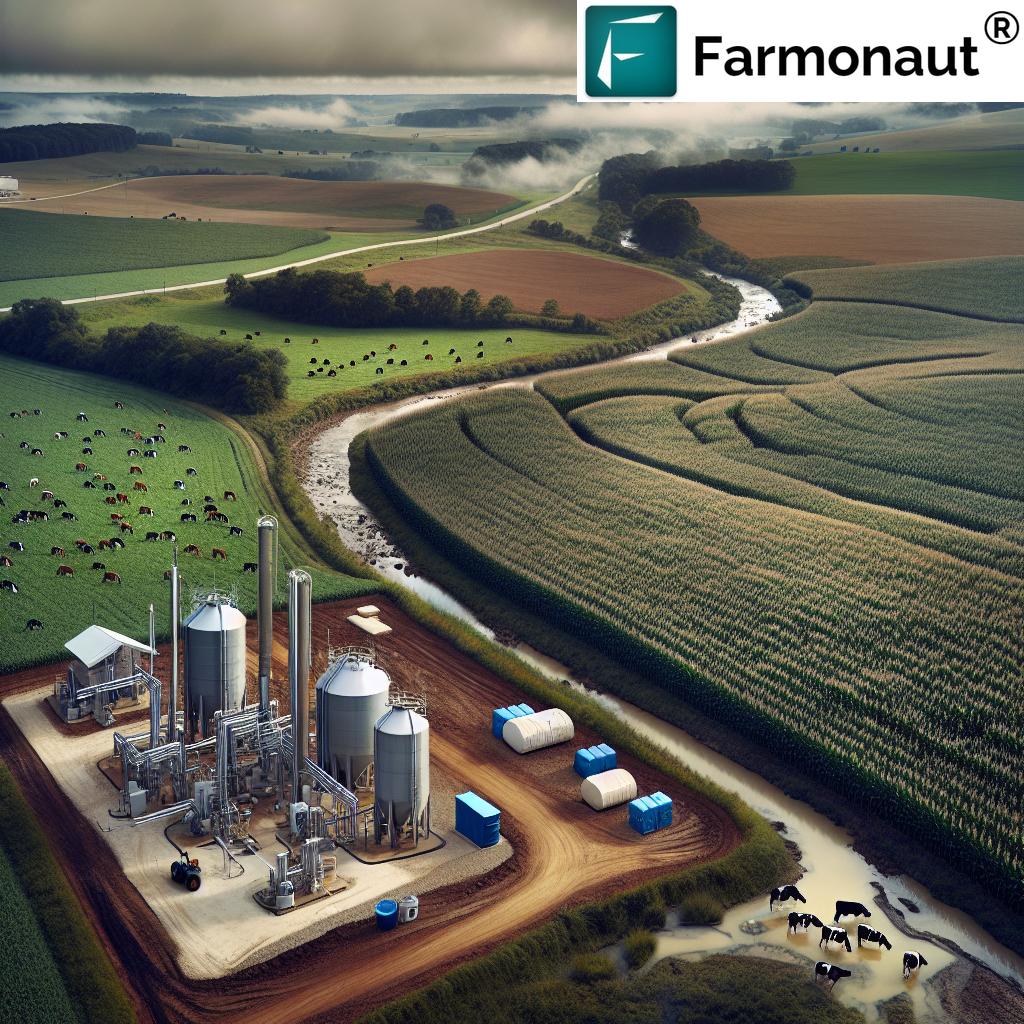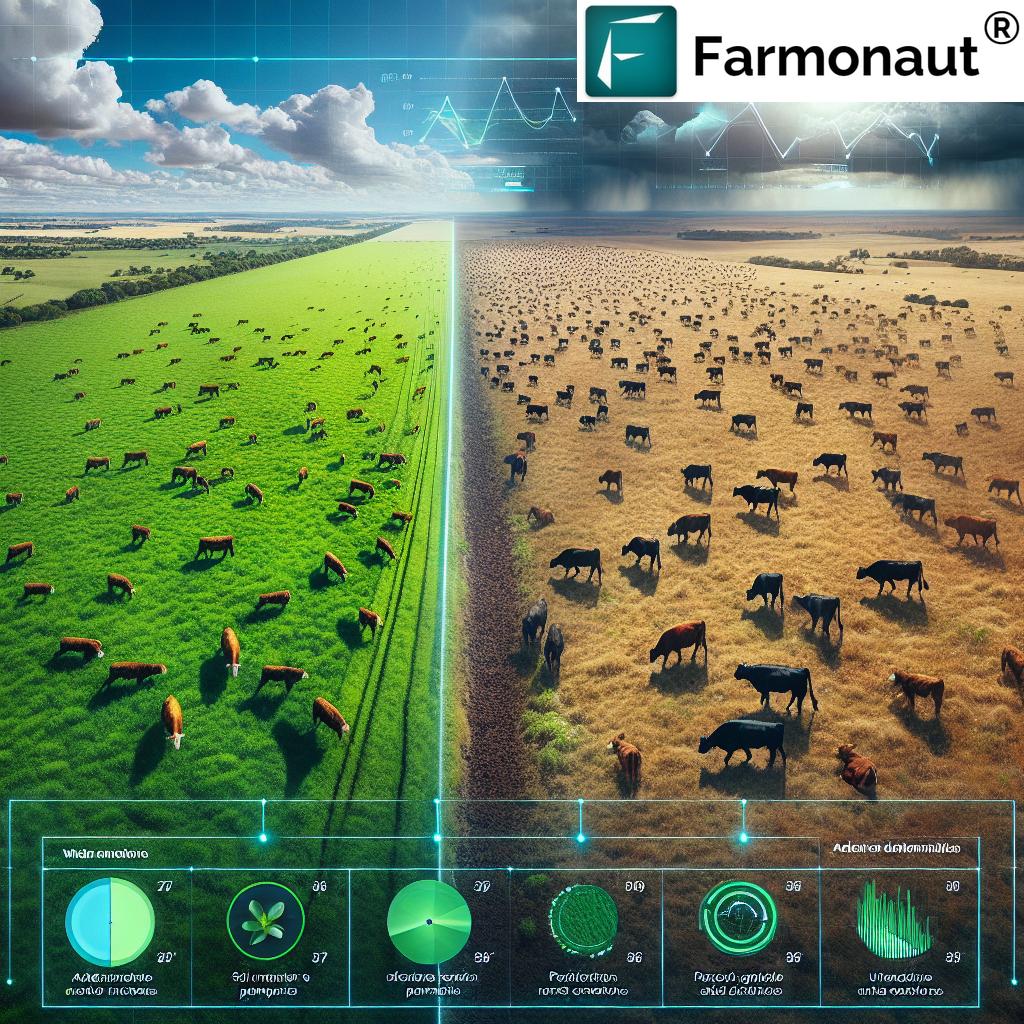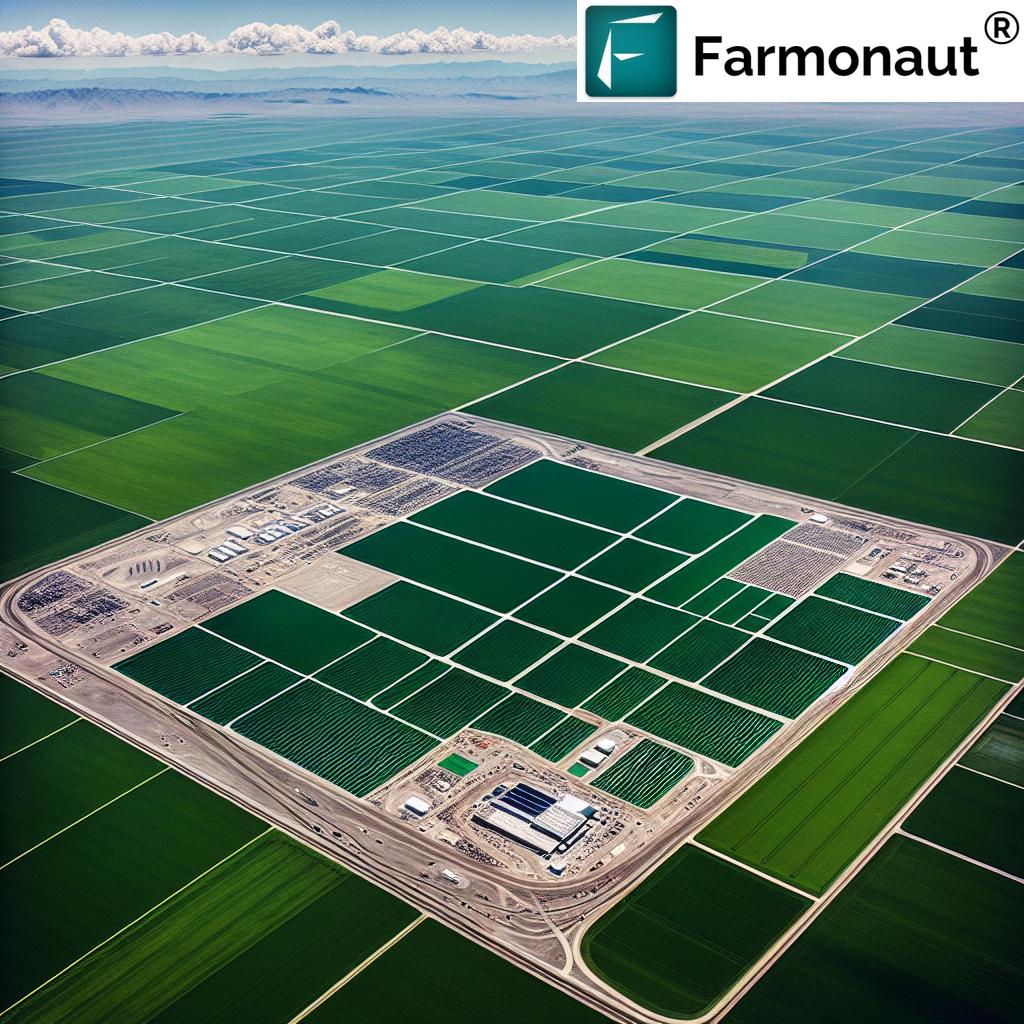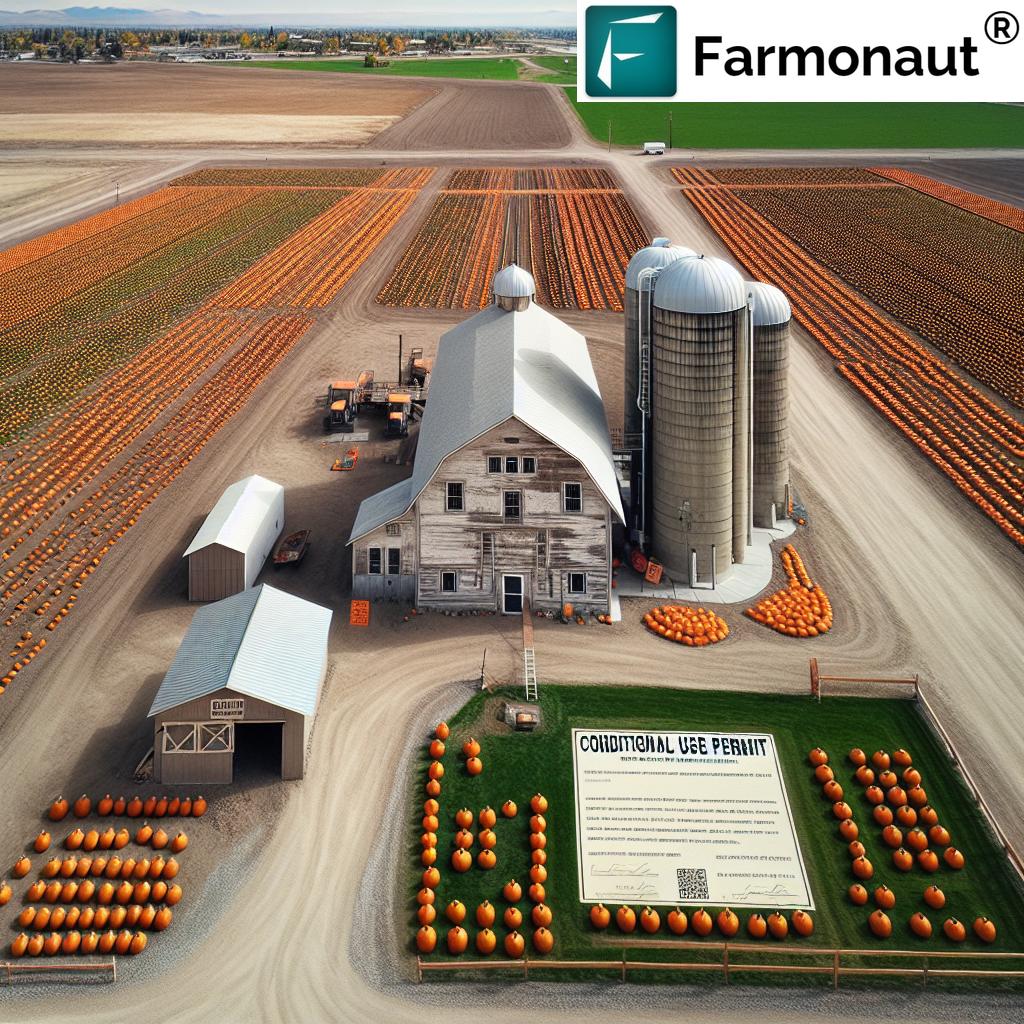Revolutionizing Kansas Farms: How Precision Agriculture Technology is Transforming Digital Farming Solutions
“Kansas farmers using precision agriculture technology have seen up to 20% increase in crop yields over traditional methods.”
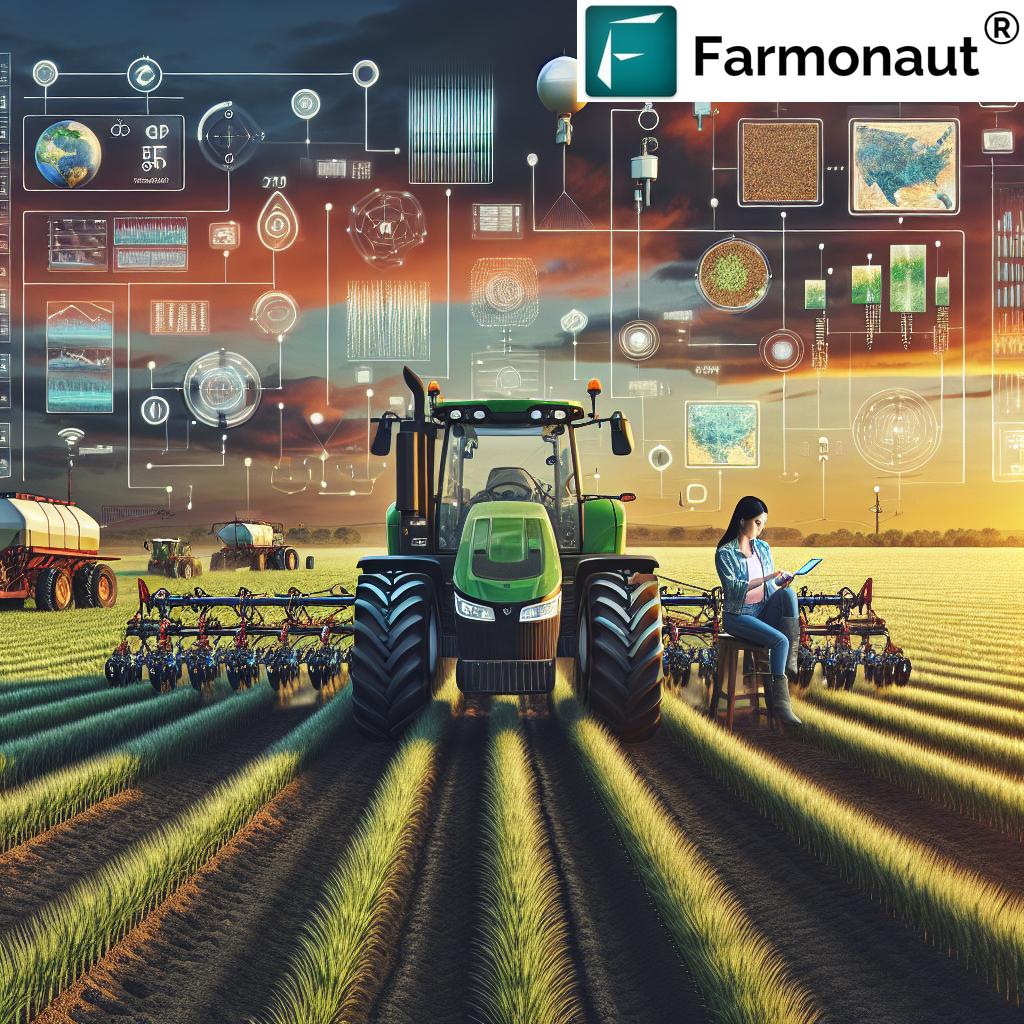
In the heartland of America, a quiet revolution is taking place. Kansas farms, once synonymous with traditional agricultural practices, are now at the forefront of a digital transformation that’s reshaping the very essence of farming. We at Farmonaut are proud to be part of this exciting journey, bringing cutting-edge precision agriculture technology to the fields of Kansas and beyond.
The agricultural landscape is evolving rapidly, and with it, the tools and techniques farmers use to cultivate their crops. Gone are the days when farmers relied solely on intuition and generational knowledge. Today, digital farming solutions are empowering growers with data-driven insights, enabling them to make informed decisions that optimize crop performance and enhance field-level profitability.
The Dawn of Digital Agriculture in Kansas
Kansas, known for its vast wheat fields and robust agricultural industry, has become a testing ground for some of the most innovative farm data management systems in the world. The adoption of these technologies is not just a trend; it’s a necessity in an era where efficiency and sustainability are paramount.
At Farmonaut, we’ve witnessed firsthand the transformative power of digital tools in agriculture. Our platform integrates satellite imagery, artificial intelligence, and machine learning to provide farmers with real-time insights into their crops’ health, soil conditions, and potential yields.
Precision Agriculture: A Game-Changer for Kansas Farmers
Precision agriculture technology is revolutionizing farming practices in Kansas by offering:
- Accurate crop monitoring through satellite imagery
- AI-driven insights for optimal resource allocation
- Data-backed decision-making tools for improved yields
- Efficient water management systems
- Targeted pest control and fertilizer application
These advancements are not just improving crop yields; they’re also contributing to more sustainable farming practices. By optimizing resource use, farmers can reduce their environmental footprint while increasing profitability.
Farm Data Management: The Backbone of Modern Agriculture
At the core of this agricultural revolution is sophisticated farm data management. Farmonaut’s platform collects, analyzes, and interprets vast amounts of data from various sources, including:
- Satellite imagery
- Weather stations
- Soil sensors
- Historical crop data
This wealth of information is then processed using advanced algorithms to provide actionable insights. Farmers can access this data through our user-friendly web and mobile applications, putting the power of big data analytics right at their fingertips.
Agronomy Decision Support Tools: Empowering Informed Choices
One of the most significant advantages of digital farming solutions is the availability of sophisticated agronomy decision support tools. These tools help farmers make critical decisions about:
- Crop selection based on soil and climate conditions
- Optimal planting times
- Fertilizer application schedules
- Pest and disease management strategies
By leveraging these tools, Kansas farmers can maximize their yields while minimizing risks associated with changing weather patterns and market fluctuations.
Collaborative Farm Management Platforms: Streamlining Operations
The complexity of modern farming operations demands a more collaborative approach. Farmonaut’s collaborative farm management platform allows various stakeholders to work together seamlessly:
- Farmers can share real-time data with agronomists for expert advice
- Farm managers can coordinate activities across multiple fields
- Service providers can schedule interventions based on up-to-date crop information
This level of collaboration ensures that everyone involved in the farming process is on the same page, leading to more efficient operations and better outcomes.
Crop Planning and Budgeting: A Data-Driven Approach
Crop planning and budgeting have been transformed by digital farming solutions. Farmonaut’s platform enables farmers to:
- Create detailed crop plans based on historical data and market projections
- Develop accurate budgets that account for all variables
- Adjust plans in real-time based on changing conditions
- Optimize resource allocation for maximum profitability
This data-driven approach to planning and budgeting helps Kansas farmers make more informed financial decisions and improve their overall farm management strategies.
“Digital farming solutions can reduce water usage by up to 30% through data-driven irrigation management in Kansas farms.”

Field-Level Profitability Analysis: Maximizing Returns
Understanding the profitability of each field is crucial for optimizing farm operations. Farmonaut’s field-level profitability analysis tools provide:
- Detailed breakdowns of costs and revenues per field
- Comparisons of different crop scenarios
- Insights into which areas of the farm are most profitable
- Recommendations for improving underperforming fields
This granular level of analysis allows Kansas farmers to make strategic decisions about crop rotation, resource allocation, and potential investments in land improvements.
Farm Risk Management Strategies: Navigating Uncertainties
Agriculture has always been a risky business, but digital tools are changing the game when it comes to farm risk management strategies. Farmonaut’s platform helps farmers:
- Identify potential risks through predictive analytics
- Develop contingency plans for various scenarios
- Monitor crop health in real-time to catch issues early
- Make data-backed decisions on crop insurance
By having a clearer picture of potential risks and mitigation strategies, Kansas farmers can protect their investments and ensure the long-term sustainability of their operations.
Explore Farmonaut’s API for advanced data integration
Digital Transformation in Agriculture: Beyond the Farm
The impact of digital transformation in agriculture extends far beyond individual farms. It’s reshaping entire agricultural ecosystems, including:
- Supply chains becoming more transparent and efficient
- Agricultural cooperatives offering more data-driven services
- Research institutions gaining access to vast amounts of real-world data
- Policy makers making more informed decisions about agricultural policies
This transformation is creating new opportunities for innovation and growth across the entire agricultural sector in Kansas and beyond.
The Role of Agricultural Analytics in Resource Management
Agricultural analytics play a crucial role in optimizing resource management on Kansas farms. Farmonaut’s platform provides powerful analytical tools for:
- Water management: Optimizing irrigation schedules based on soil moisture data and weather forecasts
- Fertilizer application: Determining precise nutrient needs for different areas of a field
- Pest control: Identifying pest hotspots and recommending targeted interventions
- Energy usage: Analyzing farm equipment efficiency and suggesting improvements
By leveraging these analytics, farmers can significantly reduce waste, lower costs, and improve their environmental stewardship.
Adoption of Digital Tools Across Agricultural Sectors
While row crops like wheat and corn have been at the forefront of digital adoption in Kansas, we’re seeing increasing use of precision agriculture technology across various agricultural sectors:
- Orchards: Using drone imagery for tree health assessment and yield prediction
- Livestock: Implementing IoT devices for herd management and health monitoring
- Specialty crops: Applying precision irrigation and climate control in greenhouses
This widespread adoption is creating a more resilient and diverse agricultural landscape in Kansas.
Access our API Developer Docs for integration guidance
Farmonaut’s Cutting-Edge Technology: Driving Agricultural Innovation
At Farmonaut, we’re committed to pushing the boundaries of what’s possible in digital agriculture. Our cutting-edge technology includes:
- Advanced satellite imagery processing for high-resolution crop monitoring
- Machine learning algorithms that improve predictions over time
- Blockchain-based systems for ensuring data integrity and traceability
- User-friendly interfaces that make complex data accessible to all farmers
These technologies are helping Kansas farmers navigate challenges and drive growth in an ever-evolving agricultural landscape.
The Future of Digital Farming in Kansas
As we look to the future, we see tremendous potential for further innovation in digital farming solutions. Some areas we’re particularly excited about include:
- Integration of 5G technology for real-time data transmission from field sensors
- Advanced AI systems that can make autonomous decisions about farm management
- Increased use of robotics for tasks like precision weeding and harvesting
- Development of more resilient crop varieties through data-driven breeding programs
These advancements will continue to transform Kansas agriculture, making it more efficient, sustainable, and profitable.
Comparison: Traditional Farming vs. Precision Agriculture in Kansas
| Farming Aspect | Traditional Methods | Precision Agriculture with Farmonaut |
|---|---|---|
| Crop Planning | Based on historical knowledge and intuition | Data-driven decisions using satellite imagery and AI algorithms |
| Resource Management | Uniform application across fields | Targeted application based on field variability |
| Yield Prediction | Rough estimates based on past performance | Accurate forecasts using real-time data and predictive analytics |
| Pest Control | Reactive, often broad-spectrum treatments | Proactive, targeted interventions based on early detection |
| Fertilizer Application | Fixed schedules and rates | Variable rate application based on soil and crop needs |
| Risk Management | Limited tools, often based on experience | Comprehensive risk assessment using predictive models |
| Decision Making | Intuition-based, sometimes delayed | Data-driven, real-time decision support |
| Data Analysis | Manual record-keeping, limited analysis | Automated data collection and advanced analytics |
| Profitability | Fluctuating, less predictable | Optimized through precision resource use and yield improvement |
| Environmental Impact | Potentially higher resource use and waste | Reduced environmental footprint through efficient resource management |
Overcoming Challenges in Digital Agriculture Adoption
While the benefits of digital farming solutions are clear, we recognize that there are challenges to widespread adoption. Some of the obstacles Kansas farmers face include:
- Initial investment costs for technology and equipment
- Learning curve associated with new digital tools
- Concerns about data privacy and security
- Reliable internet connectivity in rural areas
At Farmonaut, we’re committed to addressing these challenges by:
- Offering flexible pricing models to make our technology accessible to farms of all sizes
- Providing comprehensive training and support to help farmers get the most out of our platform
- Implementing robust data security measures to protect farmers’ information
- Developing offline capabilities for areas with limited internet access
The Impact of Digital Farming on Kansas’s Agricultural Economy
The adoption of digital farming solutions is having a significant impact on Kansas’s agricultural economy:
- Increased crop yields are boosting overall agricultural output
- Improved resource efficiency is leading to cost savings for farmers
- Enhanced predictability is helping stabilize farm incomes
- New job opportunities are emerging in agtech and data analysis
These economic benefits are helping to secure Kansas’s position as a leader in modern agriculture.
Sustainability and Digital Farming: A Perfect Match
Sustainability is a key concern for modern agriculture, and digital farming solutions are playing a crucial role in making Kansas farms more environmentally friendly:
- Precision application of inputs reduces chemical runoff
- Optimized irrigation systems conserve water resources
- Data-driven crop rotations improve soil health
- Reduced equipment usage lowers carbon emissions
By embracing these technologies, Kansas farmers are not only improving their bottom line but also becoming stewards of the environment.
The Role of Education in Advancing Digital Agriculture
As digital farming solutions continue to evolve, education plays a vital role in their successful implementation. We’re seeing increased focus on:
- Agricultural technology programs at Kansas universities
- Workshops and training sessions for farmers on digital tools
- Collaboration between tech companies and agricultural extension services
- Online resources and communities for knowledge sharing
These educational initiatives are crucial for ensuring that Kansas farmers can fully leverage the power of digital agriculture.
Conclusion: A Bright Future for Kansas Agriculture
The digital transformation of Kansas farms is well underway, and the future looks bright. As precision agriculture technology continues to advance, we at Farmonaut are excited to be part of this journey, providing innovative solutions that empower farmers, enhance productivity, and promote sustainability.
From sophisticated farm data management systems to collaborative platforms that connect various stakeholders, digital farming solutions are revolutionizing every aspect of agriculture in Kansas. As we move forward, we’re committed to continued innovation, ensuring that Kansas remains at the forefront of modern, efficient, and sustainable farming practices.
The agricultural landscape is changing, and with it, the opportunities for growth and success. By embracing digital farming solutions, Kansas farmers are not just adapting to change – they’re leading it, setting the standard for 21st-century agriculture.
FAQ Section
Q: How does precision agriculture technology improve crop yields?
A: Precision agriculture technology improves crop yields by providing farmers with detailed, real-time data about their fields. This includes information on soil conditions, crop health, and weather patterns. By using this data, farmers can make more informed decisions about when to plant, how much to irrigate, and when to apply fertilizers or pesticides. This targeted approach leads to optimal growing conditions and, consequently, higher yields.
Q: Is digital farming technology affordable for small-scale farmers?
A: Yes, digital farming solutions are becoming increasingly accessible to farmers of all scales. At Farmonaut, we offer flexible pricing models and scalable solutions that can be tailored to the needs and budgets of small-scale farmers. Additionally, the long-term benefits in terms of increased yields and resource efficiency often outweigh the initial investment costs.
Q: How does Farmonaut’s platform help with farm risk management?
A: Farmonaut’s platform aids in farm risk management by providing predictive analytics and real-time monitoring. Our system can detect early signs of crop stress, predict weather-related risks, and provide insights on market trends. This information allows farmers to take proactive measures to mitigate risks, whether it’s adjusting irrigation schedules, applying targeted treatments, or making informed decisions about crop insurance.
Q: Can digital farming solutions help with sustainability?
A: Absolutely. Digital farming solutions significantly contribute to sustainable agriculture practices. By optimizing resource use, these technologies help reduce water consumption, minimize chemical inputs, and lower energy usage. Precision application of fertilizers and pesticides also reduces environmental impact. Moreover, data-driven farming practices can improve soil health and biodiversity over time.
Q: How does Farmonaut ensure the security of farm data?
A: At Farmonaut, we take data security very seriously. We employ industry-standard encryption protocols to protect data both in transit and at rest. Our systems are regularly updated and undergo security audits. We also have strict data access controls in place and adhere to all relevant data protection regulations. Farmers have full control over their data and can choose how it’s shared or used.





